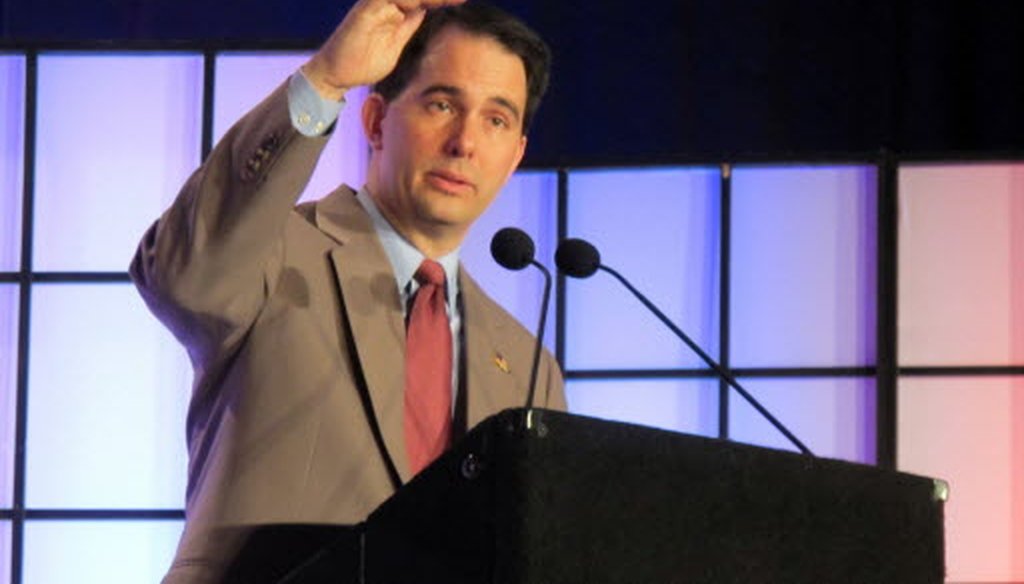Stand up for the facts!
Our only agenda is to publish the truth so you can be an informed participant in democracy.
We need your help.
I would like to contribute

After months of calling a right to work measure for Wisconsin a "distraction," Gov. Scott Walker said he would sign a bill being fast-tracked to his desk.
Depending on which politician or interest group is speaking, you may have heard that the public supports passage of a "right to work" law in Wisconsin -- or views it as a very low priority action.
"Objective polling clearly shows that the vast majority of Wisconsin residents view this issue as a distraction," said state Senate Minority Leader Jennifer Shilling, D-La Crosse.
"The public widely supports worker freedom and the potential positive impact to the state’s economy can no longer be ignored," said Assembly Speaker Robin Vos, R-Rochester.
"There is broad agreement among workers, businesses and everyday citizens that Right to Work is wrong for Wisconsin," said Assembly Minority Leader Peter Barca, D-Kenosha.
So, which is it?
A review of recent polling data suggests right to work has backing from voters from both parties -- but there is also considerable skepticism about Wisconsin getting a boost from it and a general lack of knowledge about such laws.
Right-to-work laws, in place in 24 states, bar businesses and unions from reaching labor deals that require workers to pay union fees. Generally speaking, we have found there is some evidence of economic advantage in right to work states. But evidence is lacking that right to work, rather than other factors, is the cause.
Republicans in the Legislature and Gov. Scott Walker appear poised to make Wisconsin state number 25.
Lawmakers have called themselves into "extraordinary session" for the bill. The Senate Labor Committee will hold a hearing on it Feb. 24, 2015, and the Senate will take it up as soon as Feb. 25, 2015. Under the Republicans' timetable, the Assembly will vote on the measure the following week.
Nationally, Gallup in August 2014 found that 71 percent of 1,032 respondents would vote for "right-to-work or open shop laws that say each worker has the right to hold his job in a company, no matter whether he joins a labor union or not."
A conservative Wisconsin think tank backing right to work, the Wisconsin Policy Research Institute (WPRI), used the exact same wording in a January 2015 poll of 600 adults.
The result: 62 percent would vote for it.
Both Gallup and WPRI followed up by asking about arguments in favor and against right to work.
The question: "Those in favor of right-to-work or open shop laws say that no American should be required to join any private organization, like a labor union, against his will. Do you agree or disagree with this?"
National results: 82 percent agree.
Wisconsin results: 77 percent agree.
Then respondents were asked: "Those opposed to right-to-work or open shop laws say that when all workers share the gains won by the labor union, all workers should have to join and pay dues to give the union financial support."
National: 32 percent agree, 64 percent disagree.
Wisconsin: 46 percent agree, 50.2 percent disagree.
(Note: the WPRI poll’s follow-up questions polled subsamples of its larger poll).
The bottom line on the trio of questions: A majority backs the "right to work" position on all three.
Respondents in several polls, though, were more sympathetic to unions when the question framing was "share benefits, share costs," noted Charles Franklin, a nationally recognized pollster and founder of PollsAndVotes.com.
We asked Franklin, who directs the Marquette Law School poll, to help us sort through various survey findings on right to work. (The Law School has not polled on the topic).
He said the WPRI survey was better than the other state polls because it can be directly compared to the Gallup poll, revealed its questions and asked a baseline question and ones on two additional ways to frame the issue.
Polls for opponents
Opponents of right to work point to two statewide polls.
In January 2015, Wisconsin Infrastructure Investment Now commissioned a survey of 600 likely voters. The poll found only 7 percent rated passing right to work and eliminating prevailing wage laws as the "top priority" of the state legislature.
The group, though, did not say what priorities were ranked higher and how much backing those other issues received.
And the poll’s questions were not released, just a summary, making it hard to evaluate and compare results with other polls.
"Question wording, or the framing of the issue, matters quite a bit on this issue, and it is hard to ask about the issue without framing it in some way," said Franklin. "Simply the phrase, ‘right to work’ is a framing of the issue."
A more transparent poll, done in December 2014 for the labor coalition We Are Wisconsin, found right to work ranked last among 10 priorities. It received 4 percent, trailing things such as improving schools, eliminating the budget and making health care affordable.
Both of the opponent-commissioned polls found support for a right to work law hovering at or near 50 percent -- tighter than in Wisconsin polls done for backers of right to work.
But neither poll found opponents outnumbering supporters.
Impact of laws
What do polls show about the perceived or expected impact of right to work laws in states?
There’s a lot of uncertainty about that, one recent national poll found.
The survey by Rasmussen Reports in January 2015 found that 35 percent of likely U.S. voters believe right-to-work laws are good for a state’s economy. That’s down 10 points from December 2012.
Another 28 percent are not sure, while 26 percent say such laws are bad for a state’s economy. Eleven percent think right-to-work laws have no impact.
That uncertainty may be the result of lack of awareness of right to work laws. The 2014 Gallup poll found that 45 percent had never even heard of right to work laws.
In WPRI’s Wisconsin poll, respondents were split pretty evenly on whether a law would boost business investment, hurt workers or have little impact on workers.
The poll found that 56 percent said the law would not affect economic growth or reduce it. A plurality, 40 percent, said it would help.
Partisan breakdown
A poll conducted for Wisconsin Manufacturers and Commerce, which supports right to work, found that even a plurality of Democrats surveyed supported worker "freedom to choose" on joining a union.
That jibes with an independent national poll’s finding. In 2014, Gallup found 65 percent of Democrats said they would vote for such a law.
Gallup noted that the support for right-to-work laws appears at odds with the widespread approval of Democrats for unions.
"It is possible they may be sympathetic to the concept of unions and what they stand for in theory, but may disagree with some of the specific policies unions favor that could interfere with the opportunities for non-union members to secure employment," Gallup said.
A slim majority of Americans, Gallup said, approve of unions, down from 75 percent in the 1950s when unionization was much more common.
Our Sources
Gallup poll, August 2014
WPRI poll, January 2015
Wisconsin Manufacturers and Commerce poll, December 2014
Wisconsin Infrastructure Investment Now poll, January 2015
We Are Wisconsin poll, December 2014
Rasmussen poll, January 2015
Interview with Charles Franklin, Feb. 21, 2015
Email exchange with Jim Pugh, spokesman, Wisconsin Manufacturers and Commerce, Feb. 23, 2015
Email exchange with Laura Smith, spokeswoman, Rep. Peter Barca, Feb. 22, 2015
Email exchange with Kit Beyer, spokeswoman, Rep. Robin Vos, Feb. 21, 2015
Email exchange with Tony Palese, spokesman, Sen. Jennifer Shilling, Feb. 21, 2015















































